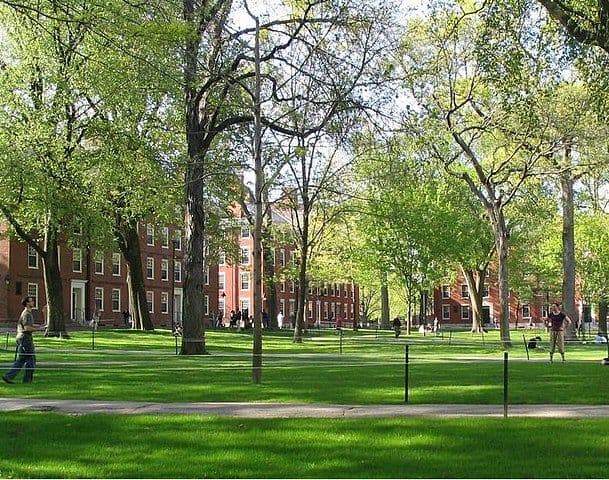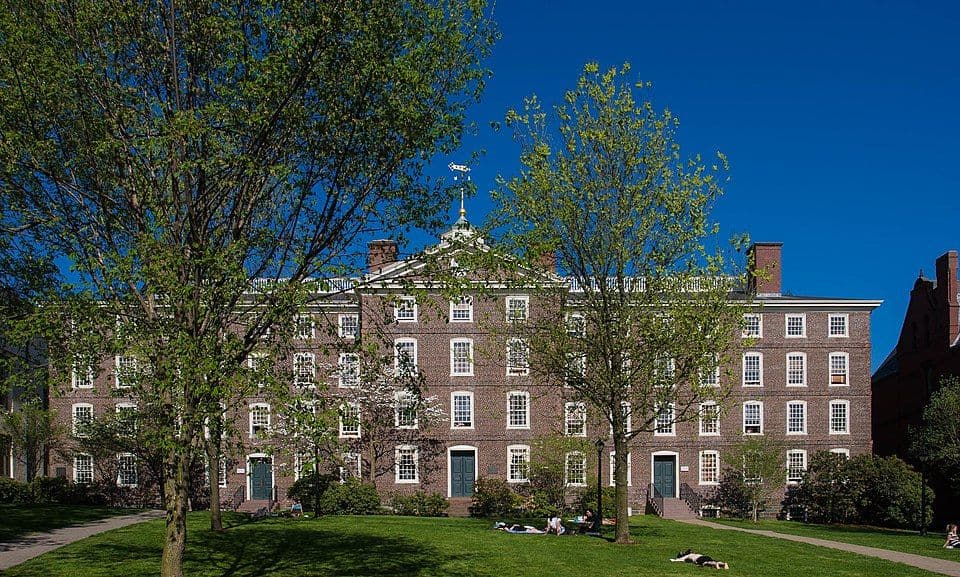
How to Get into Harvard: Building a Standout Application
Getting into Harvard is a popular goal - and one few succeed at. College admissions excerpt, John Morganelli gives Ivy Tutors Networks top tips for getting into Harvard and what to consider when applying.

Image in Public Domain
“Get into Harvard” has been at the top of college bucket lists for generations of high school students. It’s an aspirational goal, to be sure, as the chances of success are slim. If you’re serious about getting in, you’ll need to build an application based on a solid narrative foundation in addition to the traditional prerequisites (GPA, test scores, etc). Using the Morganelli Method, we break down how to get into Harvard, including steps to take during each year of high school to build a standout application. And if this is the first time you’re hearing about the Morgenilli Method, we recommend you start here.
Understanding the Harvard Acceptance Process
One thing we’ll always tell you at Ivy Tutors Network? Getting into an elite institution is not about checking "achievement boxes.” Traditional metrics matter, of course, but they’re not enough. You need the traditional markers of success and a compelling, distinctive narrative. Harvard is no exception. As one of the most selective institutions in the world, Harvard evaluates applicants beyond academics, considering their intellectual contributions, character, and how they might shape the campus environment. With tens of thousands of applicants and limited spots, the admissions process is designed to identify those whose values, achievements, and voice align with Harvard’s mission: leadership through service, global impact, and curiosity-driven inquiry.
Understanding how Harvard selects its class each year requires a shift in mindset. Rather than focusing solely on GPA, test scores, or “Tier 1” extracurriculars, applicants should approach the process with strategic intent: how does each piece of your application tell a cohesive story? What question are you asking — and how does that question position you to make an intellectual impact? By answering these questions and building your application narrative accordingly, you position yourself as a can’t miss candidate.
Harvard Acceptance Rate: What It Means
Harvard’s acceptance rate typically hovers between 3–4%, making it one of the most selective colleges globally. But that number alone doesn’t tell the full story. What the acceptance rate really reflects is the ratio of students who apply with strong credentials only, versus those who demonstrate strategic alignment with Harvard’s institutional priorities in addition to their credentials.
Harvard - and all Ivy League schools - are looking for high achievers who are also contributors. That means students who:
- Understand the structure of the university and apply to the right college type (e.g., Arts & Sciences vs. Engineering),
- Use their academic story and research question to show intellectual curiosity and a community-rooted perspective,
- Build a cohesive portfolio of activities that illustrate not just talent and leadership through contribution.
IVY’s Director of College Admissions, John Morganelli Jr., would tell you that the acceptance rate is less about odds and more about fit. Your goal isn't to “beat the statistic”, but rather to ensure your application reflects depth, alignment, and purpose. Achieving this first goal - a well-crafted application - is the key to achieving your overall goal: getting into Harvard.

By chensiyuan
How Hard Is It to Get into Harvard?
It’s difficult — but not in the way most people think.
Yes, Harvard receives over 50,000 applications a year. Yes, the majority of those applicants have top grades, rigorous courses, and near-perfect test scores. But academic excellence is only the starting point. What separates those who are admitted from those who are denied is clarity of story and purpose of contribution.
At the most competitive level, Harvard is choosing between thousands of qualified students. What matters is how well a student uses their application to communicate:
- What intellectual question(s) drives them
- How their past experiences show curiosity - and how they’ve acted on that curiosity
- Why their voice matters on campus and as part of the global community
This is why the Morganelli Method prioritizes narrative structure. When a student’s activities, research question, essays, and major selection all point to the same ethos — the same message about who they are and what they stand for — they become irreplaceable.
Academic Excellence Beyond GPA
The GPA Needed for Harvard: Debunking Myths
There is no fixed GPA that guarantees admission to Harvard. While many admitted students do have exceptional transcripts, we’d encourage you to stop asking “What GPA do I need?” Not because it doesn’t matter - it does - but because it’s not the most useful question. Instead ask “Does my academic record align with the story I’m telling?”
In the Morganelli Method, GPA is never viewed in isolation. We evaluate it within the context of:
- Course rigor and sequencing
- Narrative coherence with the student’s prospective major
- School context, including what was available, and whether the student maximized those options
Harvard is fully aware that students come from a wide range of high schools with varying grading policies and course availability. What matters most is whether you demonstrated intellectual ambition in a way that supports your broader application ethos. A 3.85 with advanced coursework that ties to your research interest is more compelling than a 4.0 with no academic direction.
In short: GPA is a signal rather than a definitive metric. Savvy students use it to reinforce their narrative, rather than to qualify or disqualify themselves.
Balancing Challenging Courses with Achievements
Harvard expects applicants to pursue the most challenging courses available to them — but it also values students who pursue those challenges with direction and balance. Simply loading up on APs or honors classes without a clear throughline can weaken your story, and consequently your application.
The Morganelli Method emphasizes strategic rigor. That means selecting advanced coursework that:
- Connects directly to your prospective major or research question
- Demonstrates intellectual courage and progression over time
- Supports a consistent narrative across in-school and out-of-school experiences
Balance also means understanding when to stretch and when to preserve bandwidth for research, advocacy, or leadership. A student applying with a sustainability narrative might take AP Environmental Science, write a local op-ed on solar zoning, and lead a club project — all of which reinforce each other. That’s more powerful than adding disconnected courses just to impress.
The goal isn’t to be impressive in every direction: it’s to be purposeful in one.
Extracurricular Distinction
The Role of Activities
Extracurriculars serve as narrative evidence. At Harvard’s level of selectivity, admissions officers are asking, “What story do these activities tell?”. Consequently, the Morganelli Method reframes activities as narrative elements that support your application ethos. This means:
- Prioritizing depth over breadth
- Choosing engagements that align with your academic story or personal ethos
- Demonstrating leadership through contribution, not just titles
For example, a student interested in public health might tutor local ESL students, conduct research on food deserts in their county, and write an article advocating for improved school nutrition policies. These may not be nationally ranked awards. But they are highly strategic, deeply personal, and thematically aligned, which makes them stand out.
Activities should form a cohesive arc. When your application is read holistically, your experiences should point in the same direction: toward a clear intellectual goal and a distinct sense of purpose.

By Meihe Chen - Own work, CC BY-SA 4.0
How Many Hours of Community Service to Get into Harvard?
There is no required number of community service hours to get into Harvard.
The relevance of community service hours for college admissions is directly tied to their impact, relevance, and authenticity. Admissions officers aren’t looking for you to have checked off the community service box, or looking for a specific number of hours. When service contributes meaningfully to your story, however, it can be an impactful part of your application.
In the Morganelli Method, service is most effective when it aligns with your academic direction or ethos. For instance, a student exploring education policy might organize a tutoring initiative in under-resourced schools. While the student’s underlying motivation might be to serve, it’s also deepening their understanding of systemic inequity. That kind of targeted involvement far outweighs hundreds of generic volunteer hours.
So instead of asking “How much is enough?”, the better question is: “How does this service reflect who I am and what I care about?” If the answer is clear and compelling, you’re on the right track.
Personality Considerations: Predictors of Success at Harvard
Harvard is not for everyone - and we’re not just talking about the challenge of getting in. A big part of the Morganelli Method is encouraging students to look at personality fit when putting together a college list. Students who thrive at Harvard tend to be internally driven, intellectually restless, and resilient in the face of challenge. While learning to handle pressure is a good college - and life - skill, Harvard is looking for those students who already thrive on challenge because they’re energized by complex questions, intense discourse, and high standards.
Successful Harvard students often share several personality traits:
- Intrinsic motivation: They pursue knowledge for its own sake, rather than external validation.
- Adaptability: They can recalibrate quickly when things don’t go as planned.
- Comfort with ambiguity: They don’t need clear paths or constant feedback to stay focused.
- Self-directedness: They are capable of setting their own academic and personal goals and executing independently.
- Intellectual humility: They know they’re bright but are eager to be challenged and proven wrong.
By contrast, students who tend to struggle at Harvard are often:
- Validation-dependent: They need regular praise or reassurance to feel secure.
- Overly perfectionistic: They shut down when faced with failure or ambiguity.
- Externally motivated: They view college as a credential to acquire, not a community to contribute to.
- Unaccustomed to academic freedom: They flounder without structure or handholding.
Harvard doesn’t offer constant check-ins. There’s no one reminding you to finish your paper or balance your mental health. The students who thrive are those who come in already practiced at managing their time, thinking independently, and bouncing back from setbacks.
This means that students who are considering Harvard need to move past the question of “Can I get in?” and ask themselves “Would I want to live and learn in an environment that assumes I’m already operating at a high level — academically, emotionally, and personally?”
The answer won’t be yes for all students - and that’s ok! Elite universities each have their own culture; consider a different institution if Harvard doesn’t sound like a fit. A good place to start? Our series on getting into the Ivies. We’ve done a blog on each of these 8 elite institutions, including their cultures and who does well there.
Navigating the Interview
How to Prepare for Harvard Interviews
Students tend to approach Harvard interviews like a really important test. We’d encourage you to tone down the anxiety (tough - we know!) and approach it like a conversation. Your interviewer is not trying to trip you up or determine how much of your AP Bio class you’ve committed to memory. They’re trying to evaluate how you think, communicate, and reflect. Here’s what they’re looking to see if you can do:
- Articulate your academic and personal interests with clarity
- Engage in thoughtful dialogue
- Show genuine curiosity and self-awareness
Harvard interviews are typically conducted by alumni, and their role is to add context to your application — not to make or break it. That said, the interview does matter when it adds depth or raises concern. If your application suggests you’re intellectually curious but your conversation feels flat, that can create dissonance and bring into question whether you belong there.
To prepare, consider the following:
- Know your academic story: Be ready to talk about what you're curious about and why.
- Reflect on past experiences: Not as a résumé list, but as stories that shaped your values and voice.
- Be conversational: This is not a TED Talk. Listen, ask questions, and be present.
In the Morganelli Method, we often suggest students reflect on the ethos of their application before the interview. What’s the message your application conveys? Your goal in the interview is to reinforce that message — naturally, honestly, and without performance.
Demonstrating Intellectual Curiosity
If there’s one trait that consistently stands out in successful Harvard applicants, it’s intellectual curiosity. Don’t be a know-it-all, but do show you can ask good questions.
In the context of an interview, intellectual curiosity can show up as:
- A fascination with a topic that you’ve pursued outside of class simply because you interested in it
- A willingness to challenge your own assumptions
- Thoughtful questions you pose to the interviewer about ideas (we’d discourage you from asking logistical questions).
Interviewers are listening for students who are excited to learn for learning’s sake. They’re tuned into how you talk about your interests and are less concerned with what those interests are. Students who say “I’ve always loved history” don’t stand out nearly as much as those who say, “I’ve been stuck on this question about power and myth since reading Thucydides last year, and it keeps showing up in everything from pop culture to policy.”
In the Morganelli Method, this is the natural outgrowth of having a well-developed research question and academic narrative. If your application is anchored in a curiosity you’ve explored across clubs, classes, and deliverables, then demonstrating intellectual curiosity becomes effortless and should be easy to bring to the interview.

By (User:Wgreaves) - Own work, CC BY-SA 4.0
Timing and Early Action Strategies
Applying to Harvard early — through its Restrictive Early Action (REA) program — can offer a slight statistical advantage, but the real strategic question is: what opportunity might you be giving up?
Harvard’s REA is non-binding, but it restricts you from applying early to other private institutions. And that restriction matters. Many selective colleges fill a substantial portion of their class through binding Early Decision (ED), often from a smaller and more favorable applicant pool. These ED rounds aren't just earlier — they’re strategically structured to boost yield and lower admit rates, meaning strong-but-not-top-of-the-pile applicants can stand out in ways they often can’t in regular rounds or REA.
For students who are not among the absolute strongest in the country — those with polished but not truly exceptional profiles — the ED round at a school like Northwestern, Duke, or UChicago may be the highest-leverage move in the entire admissions process. Choosing REA means forfeiting that opportunity.
Students who should consider applying REA often:
- Have a strong academic record through junior year with no major gaps
- Have completed their research question and major deliverables (e.g., advocacy article, additional information section)
- Have a clearly defined ethos and academic narrative in place
- Are strong enough that they’d likely be viable in both REA and ED contexts
Students who should likely not apply REA:
- Are still building narrative strength — and would benefit from using the fall to strengthen their story
- Are not in the top 1% nationally — and could gain significantly more by applying ED to a school that admits a large portion of its class early
- Have an ED-target school that aligns tightly with their academic direction and where they could be seen as a high-yield admit
The Morganelli Method treats early applications as a strategy—not a default. REA is only wise when you are not sacrificing better-positioned ED options. For most students, that trade-off is real—and cost.
How to Get Accepted into Harvard
Remember that getting into Harvard is about telling your unique story. It requires a strong application with a strategic narrative that is backed up by your academic work, extracurriculars, and independent research or project. If you're serious about crafting an application that stands out not just to Harvard, but to any top-tier institution, we can help. Schedule a free consultation with our college admissions team today, or dig into our research mentorship program specifically designed for students looking to showcase their intellectual curiosity.




